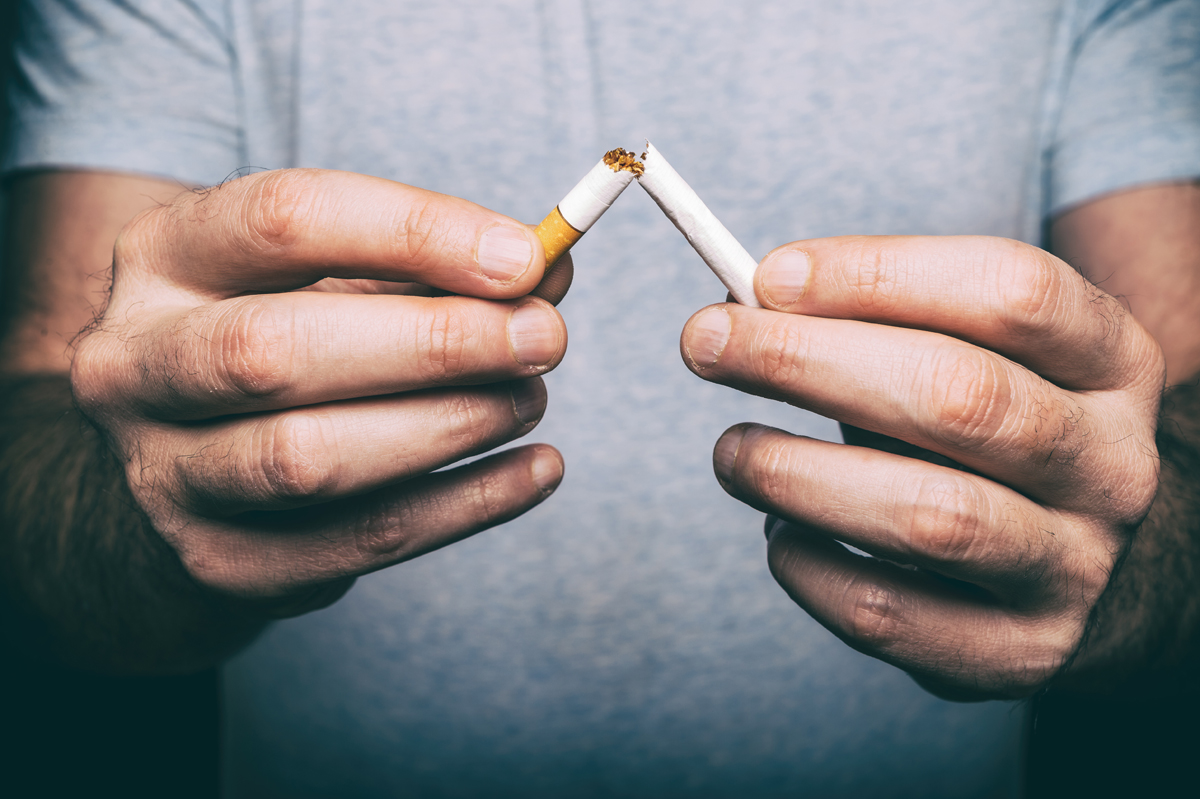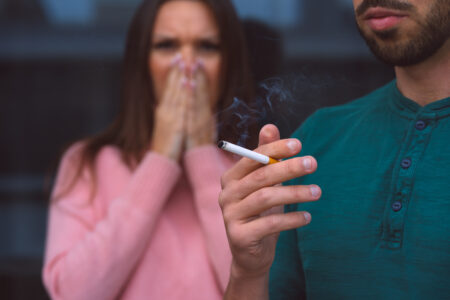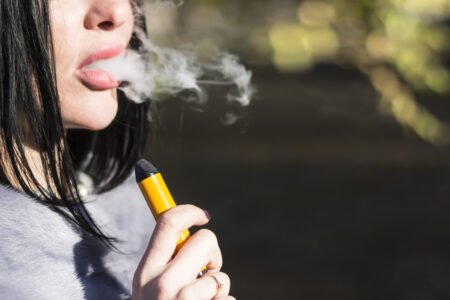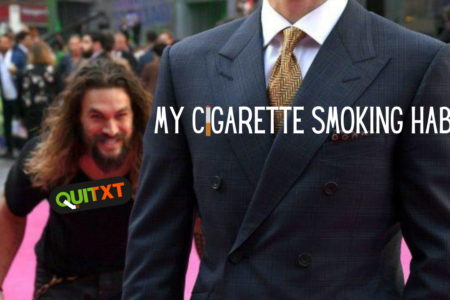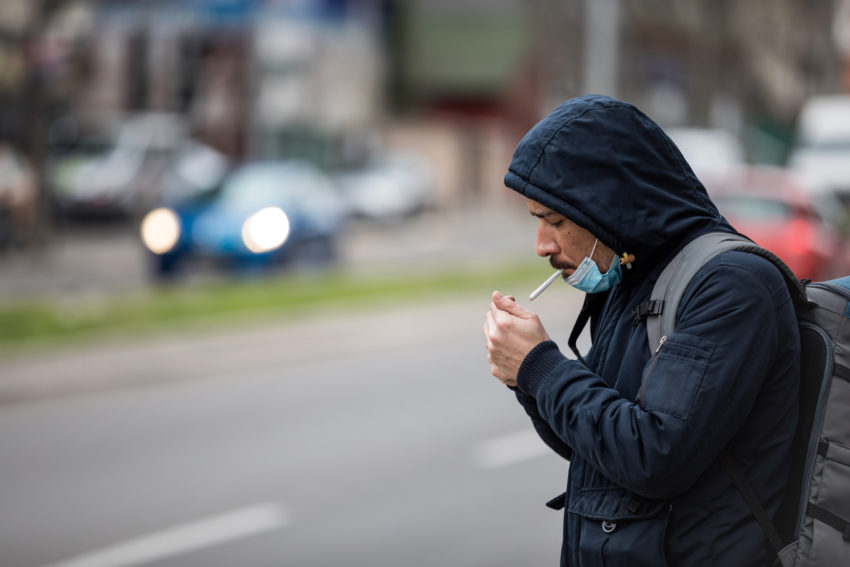
Share On Social!
Smoking and COVID-19 can each kill.
And when you compound one’s effect on the other, the harm is clearly evident.
Amid a pandemic that has killed about 100,000 Latinos, there has been a significant drop in the number of people who are attempting to quit smoking using services provided by healthcare organizations, according to a recent report from the North American Quitline Consortium (NAQC).
This is alarming considering the dangers of smoking amid the current coronavirus infecting people across the nation, according to Dr. Susan Walley, a tobacco control expert and professor at University of Alabama at Birmingham.
“Smokers are at a higher risk for greater complications such as death, admission to intensive care and mechanical ventilation when they contract COVID-19,” she told USA Today. “When someone is smoking or vaping, they can’t wear a mask, so there is concern that not only are they exposing you to secondhand smoke but also are increasing the risk for spreading or contracting COVID-19.”
Quit-Smoking Programs See Significant Drop
In 2012, the CDC began a national media campaign and started a state quitline service to tobacco users using the national portal, 1-800-QUIT-NOW.
The campaign has been highly effective in increasing calls to the quitlines, ranging from 700,000 to 900,000 annually. However, in 2020, calls to the state quitlines decreased by over 190,000 (-27%) compared to 2019.
This isn’t the only bad news.
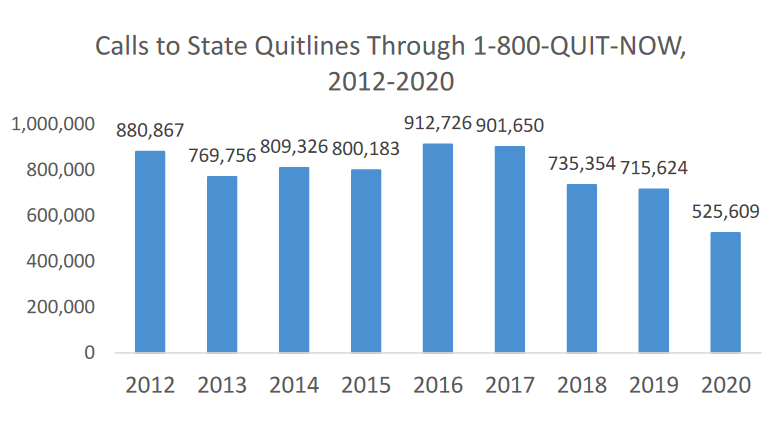
As quitline calls declined, tobacco sales have risen in the past year, after a steady decline over the past decade.
Before the start of the COVID-19 pandemic, cigarette sales had declined by 4-5% each year since 2015, according to data from the U.S. Treasury Department.
“Sales increased 1% in the first 10 months of 2020 compared to the same time frame for 2019,” NAQC’s report states. “This increase was not expected by the industry, which revised its expectation for sales mid-year in 2020.
“Stress and anxiety resulting from the pandemic may be factors in the increased use of tobacco, alcohol and other substances. NAQC suggests these factors also may have contributed to the decrease in calls to state quitlines.”
Researchers link heightened stress levels and widespread concerns over mental health to the recent drop in these programs, according to the Washington Post.
Health experts say this is problematic because smoking and vaping weakens the function of the lungs and could leave people more susceptible to COVID-19.
Why Are Health Experts Worried?
Many studies suggest that smoking is correlated with the prognosis of COVID-19. Patients who smoke have a higher risk of mortality than non-smoking patients — even with new variants spreading.
Moreover, numerous researchers have accurately linked smoking exposure with readouts that distinguish infection from sickness and provide an objective assessment of confounding factors.
In addition to COVID-19, longer duration of smoking is associated with increased risk for lung cancer, lung cancer death, and coronary heart disease.
 It’s facts like these that illustrate why health experts are concerned.
It’s facts like these that illustrate why health experts are concerned.
They are also worried about similar connections between the use of e‑cigarettes and vapes to higher COVID risks — especially since vaping causes lung irritation and injury. The development of e-cigarette and vaping products has also increased among youth smokers, and people who vape are five times as likely to get COVID-19.
Latinos and people of color are more likely to keep smoking , once they’ve started, and only half as likely as whites to quit smoking successfully.
Given that Latinos suffer a heavy burden of COVID-19 cases, deaths, other health inequities, reducing smoking is an important public health tool.
This is especially true for those who are suffering mental illness amid the pandemic. Rates of anxiety and depression have also been on the rise over the past year. A third of Americans show signs of the pandemic’s psychological toll.
“Smoking is a big challenge for people with serious mental illness, and our population represents a significant subset of people who smoke,” Ken Duckworth, chief medical officer of the National Alliance on Mental Illness, told USA Today.
‘Quitxt’ Can Help You Quit Smoking
During the pandemic, it’s especially important for smokers to consider quitting, according to Linda Bailey of the North American Quitline Consortium.
“Bailey said state and local health departments were overwhelmed during the early weeks of the pandemic and did not have time or resources for extra messaging about the harms of tobacco. However, public health warnings resumed later in 2020 and Bailey said she expects more people will seek to kick smoking habits this summer,” according to USA Today.
Quitting smoking isn’t easy, as nicotine is addictive.
“Quitting will help your lungs and heart to work better from the moment you stop. Within 20 minutes of quitting, elevated heart rate and blood pressure drop. After 12 hours, the carbon monoxide level in the bloodstream drops to normal,” according to the World Health Organization (WHO). “Within 2-12 weeks, circulation improves and lung function increases. After 1-9 months, coughing and shortness of breath decrease. Quitting will help to protect your loved ones, especially children, from exposure to second-hand smoke.”
You can get help from the free Quitxt Program from Dr. Amelie Ramirez’ team at UT Health San Antonio.
The Quitxt program, developed with the support of the Cancer Prevention and Research Institute of Texas, is a bilingual service for smartphones that sends messages via text or Facebook Messenger to help coach and encourage people on the journey toward smoking cessation.
Messages are culturally and regionally tailored to support young adults, including help using nicotine replacement options, such as gum, patches, and lozenges.
“Smoking is an extraordinarily potent addiction for which many excellent treatments and support systems are available right now,” Ramirez said.
What Else Can We Do to Promote Clean Indoor Air?
This answer is UT Health San Antonio’s new “Mil Gracias for Not Smoking Indoors!” campaign.
The Mil Gracias campaign is led by a group of local health experts: Dr. Amelie G. Ramirez, health disparities researcher and director of Salud America! at UT Health San Antonio; Dr. Claudia Miller, allergist/immunologist and professor emeritus at UT Health San Antonio; and Dr. Mandie Svatek, a pediatrician at UT Health San Antonio who leads the South Texas Asthma Coalition.
At the campaign website, you can take three big actions:
- Email a “thank you” message to a smoker for not smoking indoors to keep our families healthy.
- Sign a letter to acknowledge the harms of secondhand smoke exposure.
- Share the benefits of reducing secondhand smoke in multifamily dwellings.
“Smokers have the power to slow the spread of COVID-19 by taking it outside and away from people, protecting them from the known secondhand smoke dangers and the possibility of coronavirus airborne transmission,” Ramirez said. “Smokers who do not smoke indoors deserve our thanks.”
Mil Gracias aims to help people understand the dangers of secondhand smoke and take action to prevent any possible spread of the coronavirus and other tobacco-related health problems, Miller said.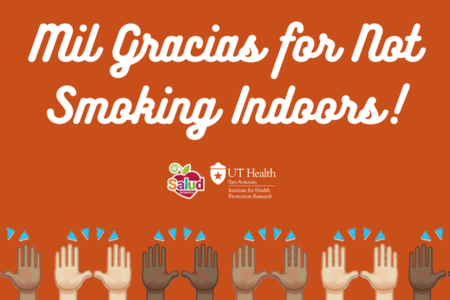
“Most know that smoking harms the smoker, but few realize there is solid research linking secondhand smoke to asthma, SIDS, COPD, recurrent ear and pulmonary infections, many cancers, and, potentially, COVID-19,” Miller said. “The personal, social, and financial costs of secondhand smoke are incalculable.”
By The Numbers
24
percent
of Mexican American-nonsmokers are exposed to secondhand smoke

